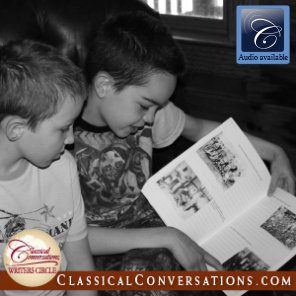Dear CC Mom,
I have learned so much about the classical model in the past few years (I still have a long way to go!), and I admit that it has sometimes gone against what my preconceived notions and tendencies are! I just finished reading Echo in Celebration by Leigh Bortins for the third time. It takes me a while to break old habits; I am so hardheaded. I have to read and reread and remind myself that I am choosing a better education for my children than what I received.
I am most definitely not an expert. I make mistakes and have a tendency to lose my focus. It is utterly amazing that anyone would ever take the time to even glance at what I have to say, much less ask me questions or request my opinion. Although I am an imperfect mom trying to figure out how to restore my own education while educating my children, I love to share what is on my heart—the things I am learning, the things I am starting to understand. Maybe my thoughts will help you,
As far as education is concerned, I have discovered that one of the most important things to consider in this foundational, early-grammar stage is that memorizing the memory work is more important than fleshing out the memory work. If your child never asks “why” about the history sentences (or science facts or Bible verses or poetry) you are memorizing, that is okay! Children are geared more towards memorizing and absorbing information and sitting on our laps listening to stories. When our children ask why, then they are ready to know why.
Little children are more content with memorizing a song about the kings of England without caring who each king was or why he became king. They just want to sing the fun song or say the silly chant. If they ask “Why?”, then answer them. Teachers lose a lot of time waiting for understanding to occur before they teach something new. I don’t care if my sons understand the periodic table of chemistry in 3rd grade, but I know it is easiest to memorize in elementary school. They won’t want to memorize it in middle school like they do in their younger years… (Echo in Celebration, page 57).
Even though I read this a couple of years ago, I still attempted to teach my children to understand what we were memorizing—to “dig in deeper” with multiple projects to gain understanding. Yet many times in the midst of a project or activity, they stared at me with blank expressions or, to my utter chagrin, started humming the theme from Pink Panther. They were simply not interested and incredibly distracted. How much time have I wasted trying to get them to understand something when they are not ready or interested in understanding?
Maybe it is better just to read some engaging narrative stories and simply enjoy this time with them in their younger years. In fact, reading through a science picture book or narrative history text like Story of the World (without even correlating it!) creates another layer of learning and exercises our children’s memories. It is enjoyable, effective, and easy.
Classical education should not be complicated, especially at the grammar stage. Perhaps this is the very reason that Classical Conversations does not offer structured lesson plans? It certainly gives parents the time and flexibility to create habits of discipline (obedience, math, memory work) and to read, read, read with their children instead of trying to figure out what supplies are needed for which project and at what time. It even gives us the flexibility to pursue some child-driven, interest-led learning in preparation for presentations each week. (How many learning opportunities have I missed simply because my child’s interests did not tie in to the memory work?)
…And I see frustrated parents who have over-estimated their high school child’s elementary education, realize they haven’t prepared their child adequately at the grammar stage, and so lower their standards for their older child’s education just at the time the student is really ready to become a mature learner (Echo in Celebration, page 56).
I am compelled to ask myself, “Am I one of those parents? Am I opting to do all the extra stuff that makes me feel like a great teacher because it is outcome-based? In so doing, am I neglecting the discipline of copywork and other foundational skills that will adequately prepare my child for mature learning later down the road?”
There is only so much time in a day. What am I going to neglect and what am I going to pursue? This is a difficult question for me. It is a question we will explore further in my next articles.
To be continued…
(To read Brandy’s second “Letter to a New CC Mom” click here.)




